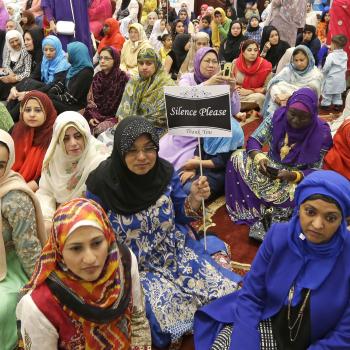By Shireen Hamza
A schism has occurred in my religious community. Of the many reasons I could have imagined a Muslim, American college student might find herself socially boycotted by some of her Muslim peers, this was not one of them. In the past two weeks, my grief over the loss of my religious leader, Dr. Syedna Mohammad Burhanuddin, was compounded by the loss of most of my childhood friends, and all of my classmates from the seminary I used to attend (Al-Jamea-tus-Saifiya). Messages (inaccurately) portraying me as a proselytizer, using black magic and shoving perfume in people’s faces to convert them to my beliefs have been circulated on the internet and through social media. I have even been shunned by Rutgers students belonging to my religious community, the Dawoodi Bohras.
Just weeks ago, the sight of another woman wearing a colorful hijab like mine (a rida) on campus was a cause for cheer and comfort in the shared understanding and solidarity between us. Seeing many other Muslim women who wear the hijab at Rutgers has always been a very visible reminder to me that we are a welcome part of the Rutgers community, despite the continued, sinister presence of Islamophobia in America. I have grown to love Rutgers as a place of intellectual growth and diverse community, and my appreciation of this place is precisely why I am outspoken about the difficulties that Muslims and especially Muslim women face at Rutgers, and the need for tolerance and awareness of all marginalized peoples. I have rarely come across anti-Shi’a sentiment in the ethnically and religiously diverse Muslim population here, and I could never have dreamed that I would become the subject of hatred of my fellow Dawoodi Bohras.
Religion blogs have covered the recent passing away of our beloved Syedna as well as the current dispute over succession, but I will summarize the situation briefly. After the passing away of our spiritual leader, Dr. Syedna Mohammad Burhanuddin, on January 17th, a contention arose as to the identity of his true successor. Syedna Burhanuddin’s followers, the Dawoodi Bohras, are a sect of Shi’a Muslims based in the South Asian subcontinent, but with followers and communities all over the world, including a few thousand in America. The rift occurred when, after the passing of our beloved Syedna, his second-in-command and brother Syedna Khuzaima Qutbuddin announced that he was the true successor of Syedna Burhanuddin. He did this by sending a personal youtube message (available at fatemidawat.com) to the community via email. However, since a public announcement two years ago, after Syedna had suffered a stroke, the community had believed that his son, Syedna Mufaddal Saifuddin, was his successor. Most of the community still accepts Saifuddin as their leader, although many who live in Dawoodi Bohra communities are afraid to publicly announce their belief in Syedna Qutbuddin. Various tactics have been used by people in the Saifuddin administration, including hate speech against Qutbuddin in the masjid, as well as the door-to-door collection of signatures in support of Saifuddin. Community members who were suspected of harboring sympathies for Syedna Qutbuddin were pre-emptively asked to sign forms swearing their allegiance to Saifuddin. Many also fear being ostracized by friends and even family members, if they openly support Syedna Qutbuddin. These instances are not hearsay; I mention only the first-hand experiences of people I have spoken to in the past two weeks.
Currently, I live in an environment with people of diverse racial identities and class backgrounds, of different belief systems, of various gender identities and sexual orientations, and I am learning to be more mindful of the differences in people’s worldviews. There are many ways that my careless speech could negatively impact people, and probably has. I view this self-education and mindfulness as an ethical responsibility, and find many instructions in my faith to behave compassionately with all people. The instruction of the Prophet to live an existence free from harming others has particular resonance to me on a political and ecological level. Syedna Mohammad Burhanuddin’s sermons have taught me that Islam is totally applicable to life in modernity, and he has demonstrated that our faith is a living tradition, not something static, frozen in the 7th century.
Many of my friends are not upholding the peace-loving and tolerant standards of the community we grew up in, and I wonder if some are being swayed by the hateful and fear-inducing messages being shown at Dawoodi Bohra masjids all over the world. The only communications I have received from my friends, after telling them of my choice to believe in Syedna Qutbuddin, have been ardent, even angry attempts to convince me to “see the light,” mournful expressions of regret, or prayers for me to receive guidance. The majority of my friends have not contacted me since I have disclosed my choice to them, though they must know how isolating this experience is. Since announcing my choice to my friends, I have made it a point to keep my reasons to myself, except when asked. I do this out of respect for other people’s belief in Mufaddal Saifuddin, knowing that my explanations necessarily include disapproval of someone whom they love and cherish. In the past week, I have stopped accepting offers to “discuss” (or, inevitably, argue) this topic, because it is painful to hear the person I venerate as my spiritual leader being unhesitatingly slandered. I would like to continue my friendships within the Dawoodi Bohra community because I love and respect my friends as individuals, despite our diverging beliefs. Sadly, I am no longer sure that that love and respect is mutual.
I suppose that my disappointment is a naive reaction. Of all people, a Muslim in post-9/11 America should not be surprised at how easily hatred can be born of irrational fear. Wading through the chaotic discourse and constant stream of propaganda employed by people on all sides of this issue, it becomes clear that there are multiple histories and narratives of Syedna Burhanuddin’s time as the leader of the Dawoodi Bohras, and everyone will find reasons for the marginalization of his second-in-command over the past twenty years that support their own narrative. History is not easily demarcated as “ended,” that it might repeat itself. It is as constant and continuous as its employment by those seeking power. I still have hope that I will reconnect with friends “on the other side,” whether in the near or distant future, because the support, compassion and friendship I have found in a country in which the media constantly misrepresents me have shown me that the human connection can trump narratives we inherit.
These events have been a cause for me to thoroughly interrogate the role of religion in my life, which has been a struggle for me since my childhood. I am by no means a religious scholar, though I have had the privilege and mobility to travel halfway across the world in pursuit of a deeper knowledge of our tradition. Since coming back from the seminary in Karachi where I spent my high school years (Al-Jamea-tus-Saifiyah), I have had to reapply the edicts of our tradition to new scenarios. I was initially drawn to my faith because its foundation and motivation rests on love, and that attraction has been continuous throughout my life, regardless of how my understanding of faith has grown and changed. I felt myself moving away from the community and communal worship in the past two years, and even wondered if my commitment to social justice and certain progressive politics was incompatible with the way Dawoodi Bohras practice religion. I am inspired by the way Syedna Qutbuddin envisions the practice of our faith. He has encouraged all of his daughters and sons to benefit from and contribute back to systems of higher education, and that is a large assurance to me that his view on education for women is not empty rhetoric. Additionally, whenever my family has donated to his charity “Zahra Hasanaat” we have received a full receipt of the way the money was used, down to the number of people who were served food. This gives me hope that he would make good on his promises of transparency in community finances.
I know that some who follow Mufaddal Saifuddin are also committed to liberal values, but I have personally tried and failed to apply his messages to my attempts to lead an ethical life as an open-minded, open-hearted Muslim college student in America. I cannot support a line of thinking that condemns women for working in call centers because they might “fall into sin,” without providing an acceptable, equally lucrative alternative, or addressing the larger problem: the global inequalities that have made a job at a call center catering to Western consumers a means to pull an entire Indian family out of poverty. While Syedna Burhanuddin warned his followers against falling prey to the Western cultural hegemony, he by no means forbid women from participating in the global economy in a professional capacity. Rather, he gave his support to all men and women who sought to educate themselves, and as a result, there are many male and female doctors, lawyers, technologists, and other highly-skilled professionals in the community today. In his remarks about call centers, Saifuddin shamed those working women without correspondingly organizing a communal effort to provide working women with a realistic alternative means to support themselves and their families. Saifuddin has encouraged women to participate in communal efforts encouraging women to always wear the hijab in public “for their own safety,” and to gain proficiency in domestic skills. These are themes that he has emphasized with great force in his sermons. I was alarmed by reports from multiple women, from the poor districts of Pune to the affluent neighborhoods of Mumbai to suburban New Jersey, of a group of women from the community coming to their homes and asking them to sign pledges committing them to always wearing the rida (the Dawoodi Bohra hijab) outside of the house. Some were told to sign the form or be removed from the increasingly invasive online database of Dawoodi Bohras, through which permission was granted to attend the sermons of Syedna Burhanuddin. Syedna Burhanuddin had repeatedly encouraged women to wear the rida out of pride in their identity, rather than out of fear of their community or as a result of compulsion by their husbands. I have had the privilege to choose to wear the rida in public, as an act of worship and a statement of identity, and I would hope that that would continue to be a choice, rather than a compulsion, for women in our community. Rather than dismantling systems of female oppression in the South Asian subcontinent, systems that are always compounded by poverty, this line of thinking only works to solidify the role of women as second class citizens within the community.
I feel a strong connection to Syedna Qutbuddin, as I did to Syedna Burhanuddin, and my recent choice has cleared much of the cognitive dissonance that I have struggled with over the past two years. My choice is, in some ways, a new beginning, and in some ways a reconnection to an ancient continuity. Still, I know that staying true to my faith and moral compass will constantly require self-awareness and consciousness of others. I am grateful to the saints, leaders, teachers, thinkers, poets, friends and family who have helped me, people from a variety of time periods, faiths, and walks of life. I know that approaching the future with an open mind is compatible with my faith, and, with much help and support, I’m ready to face that challenge.
Shireen Hamza is a Shi’ah Muslim American woman studying English & Arabic literature at Rutgers, the State University of New Brunswick.
Editorial Note: You can read a response to Ms. Hamza’s article here: No Schism, Just Sadness: A Dawoodi Bohra Responds.












